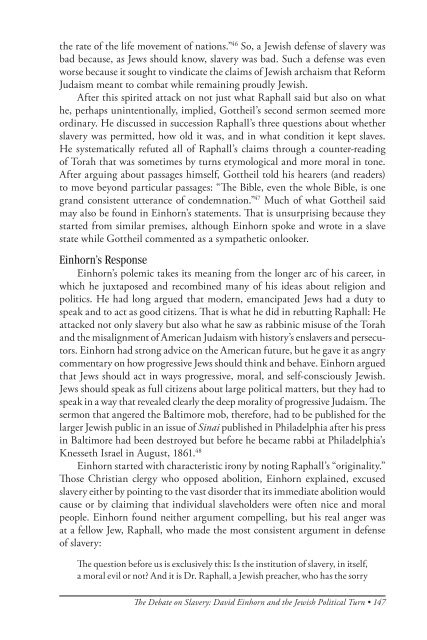American Jewish Archives Journal, Volume 64, Numbers 1 & 2
American Jewish Archives Journal, Volume 64, Numbers 1 & 2
American Jewish Archives Journal, Volume 64, Numbers 1 & 2
Create successful ePaper yourself
Turn your PDF publications into a flip-book with our unique Google optimized e-Paper software.
the rate of the life movement of nations.” 46 So, a <strong>Jewish</strong> defense of slavery was<br />
bad because, as Jews should know, slavery was bad. Such a defense was even<br />
worse because it sought to vindicate the claims of <strong>Jewish</strong> archaism that Reform<br />
Judaism meant to combat while remaining proudly <strong>Jewish</strong>.<br />
After this spirited attack on not just what Raphall said but also on what<br />
he, perhaps unintentionally, implied, Gottheil’s second sermon seemed more<br />
ordinary. He discussed in succession Raphall’s three questions about whether<br />
slavery was permitted, how old it was, and in what condition it kept slaves.<br />
He systematically refuted all of Raphall’s claims through a counter-reading<br />
of Torah that was sometimes by turns etymological and more moral in tone.<br />
After arguing about passages himself, Gottheil told his hearers (and readers)<br />
to move beyond particular passages: “The Bible, even the whole Bible, is one<br />
grand consistent utterance of condemnation.” 47 Much of what Gottheil said<br />
may also be found in Einhorn’s statements. That is unsurprising because they<br />
started from similar premises, although Einhorn spoke and wrote in a slave<br />
state while Gottheil commented as a sympathetic onlooker.<br />
Einhorn’s Response<br />
Einhorn’s polemic takes its meaning from the longer arc of his career, in<br />
which he juxtaposed and recombined many of his ideas about religion and<br />
politics. He had long argued that modern, emancipated Jews had a duty to<br />
speak and to act as good citizens. That is what he did in rebutting Raphall: He<br />
attacked not only slavery but also what he saw as rabbinic misuse of the Torah<br />
and the misalignment of <strong>American</strong> Judaism with history’s enslavers and persecutors.<br />
Einhorn had strong advice on the <strong>American</strong> future, but he gave it as angry<br />
commentary on how progressive Jews should think and behave. Einhorn argued<br />
that Jews should act in ways progressive, moral, and self-consciously <strong>Jewish</strong>.<br />
Jews should speak as full citizens about large political matters, but they had to<br />
speak in a way that revealed clearly the deep morality of progressive Judaism. The<br />
sermon that angered the Baltimore mob, therefore, had to be published for the<br />
larger <strong>Jewish</strong> public in an issue of Sinai published in Philadelphia after his press<br />
in Baltimore had been destroyed but before he became rabbi at Philadelphia’s<br />
Knesseth Israel in August, 1861. 48<br />
Einhorn started with characteristic irony by noting Raphall’s “originality.”<br />
Those Christian clergy who opposed abolition, Einhorn explained, excused<br />
slavery either by pointing to the vast disorder that its immediate abolition would<br />
cause or by claiming that individual slaveholders were often nice and moral<br />
people. Einhorn found neither argument compelling, but his real anger was<br />
at a fellow Jew, Raphall, who made the most consistent argument in defense<br />
of slavery:<br />
The question before us is exclusively this: Is the institution of slavery, in itself,<br />
a moral evil or not? And it is Dr. Raphall, a <strong>Jewish</strong> preacher, who has the sorry<br />
The Debate on Slavery: David Einhorn and the <strong>Jewish</strong> Political Turn • 147
















